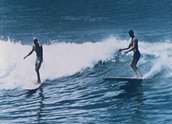
Service in the Sun (1957)
Synopsis
In 1956, after Australians have enjoyed the Melbourne Olympics, members of the American and Hawaiian surf lifesaving teams come to Sydney to show the latest surfing techniques, on their new lightweight balsawood boards. Young Australian boys meet the great Hawaiian waterman Duke Kahanamoku who displays the board he made in Australia during his first visit in 1914–15. He extols the virtues of joining the surf lifesaving movement, hoping they will do their duty.
Curator’s notes
Service in the Sun was made as propaganda, both for the surf lifesaving movement and the oil company Ampol, but it ended up as propaganda for the new American style of surfing, known as hot-dogging. Young Australian boys, the lifeblood of the surf lifesaving clubs, were expected to watch this and recognise their duty – to train hard, improve their bodies and learn the skills that would help them save lives on Australian beaches. Instead, many of them saw a display of surfing technique that was so new, and so dazzling, that they were lured away towards a freer lifestyle. The film probably hastened the split between surfers and surf lifesaving clubs that caused such bad blood in the early 1960s.
Is in his book Surfmovies: The History of the Surf Film in Australia (2000, Shore Thing Publishing, ISBN 0 9587420 3 0), Albie Thoms describes the three-and-a-half minutes of surfing we see here, by Californians Greg Noll, Mike Bright and Hawaiian Tom Zahn, as ‘one of the most significant sequences recorded in an Australian surfing film … that forever altered the way Australians approached the riding of waves’.
The film was made by Cinesound, which was by then largely concentrating on newsreels and sponsored films. This was one of several films about surf lifesaving sponsored by the oil company Ampol, which proudly proclaimed itself Australian owned.
The Americans sold their balsa boards to Australians when they left. The modern Australian surfboard manufacturing industry started in earnest soon after as new companies sprang up in Brookvale, NSW, to cope with demand for copies of the new ‘Malibu’ surfboards.
- Overview
- Curator’s notes
- Video 1 clip
- Principal credits
- Find a copy
- Make a comment
- Map
- Add your review



